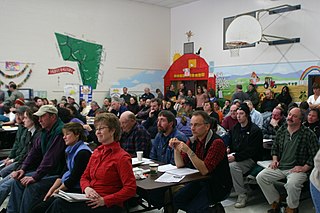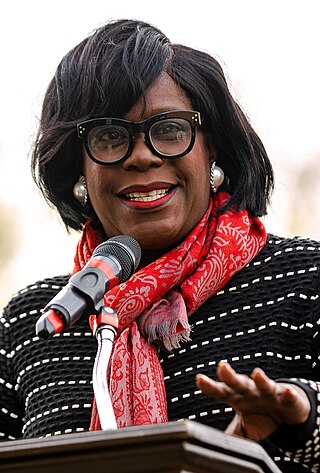
The mayor of Los Angeles is the head of the executive branch of the government of Los Angeles and the chief executive of Los Angeles. The office is officially nonpartisan, a change made in the 1909 charter; previously, both the elections and the office were partisan.

Town meeting, also known as an "open town meeting," is a form of local government in which eligible town residents can directly participate in an assembly which determines the governance of their town. Unlike representative town meeting where only elected representatives can participate in the governing assembly, any town voter may participate in an open town meeting. This form is distinct from town hall meetings held by elected officials to communicate with their constituents, which have no decision-making power.

The Philadelphia City Council, the legislative body of Philadelphia, Pennsylvania, consists of ten members elected by district and seven members elected at-large. The council president is elected by the members from among their number. Each member's term is four years, and there are no limits on the number of terms a member may serve.

Francis Lazarro Rizzo was an American police officer and politician. He served as commissioner of the Philadelphia Police Department (PPD) from 1967 to 1971 and mayor of Philadelphia from 1972 to 1980. He was a member of the Democratic Party throughout the entirety of his career in public office. He switched to the Republican Party in 1986 and campaigned as a Republican for the final five years of his life.

The mayor of Philadelphia is the chief executive of the government of Philadelphia, Pennsylvania, as stipulated by the Charter of the City of Philadelphia. The current mayor of Philadelphia is Cherelle Parker, who is the first woman to hold the position.

The mayor of Cleveland is the head of the executive branch of government of the City of Cleveland, Ohio. As the chief executive in Cleveland's mayor–council system, the mayor oversees all city services and is "responsible for enforcing the city charter, city ordinances, and the laws of the State of Ohio." The mayor's office is located at Cleveland City Hall at 601 Lakeside Avenue in Downtown Cleveland. Since 1836, the city has had a total of 54 mayors, including the city's current mayor, Justin Bibb, encompassing 58 mayoral administrations, as four mayors have served in non-consecutive terms.

Most U.S. states and territories have at least two tiers of local government: counties and municipalities. Louisiana uses the term parish and Alaska uses the term borough for what the U.S. Census Bureau terms county equivalents in those states. Civil townships or towns are used as subdivisions of a county in 20 states, mostly in the Northeast and Midwest.

The mayor of the City of San Diego is the official head and chief executive officer of the U.S. city of San Diego, California. The mayor has the duty to enforce and execute the laws enacted by the San Diego City Council, the legislative branch. The mayor serves a four-year term and is limited to two successive terms.

The New York City Council is the lawmaking body of New York City in the United States. It has 51 members from 51 council districts throughout the five boroughs.
A municipal council is the legislative body of a municipality or local government area. Depending on the location and classification of the municipality it may be known as a city council, town council, town board, community council, rural council, village council, or board of aldermen.

Constance Hopkins Snow Dallas was an American politician. A member of the Democratic Party, she served on the Philadelphia City Council as a representative of the city's 8th district. Born in New York and educated in Europe, Dallas came to Philadelphia as a teenager. After marriage and raising children, she entered local politics as a reform-minded Democrat. Following an unsuccessful run for City Council in 1947, she was elected in 1951, the first woman to serve in that legislative body.
The following table lists the individuals who served as mayor of Hartford, Connecticut, their political party affiliations, and their dates in office, as well as other information.

The 1951 Philadelphia municipal election, held on Tuesday, November 6, was the first election under the city's new charter, which had been approved by the voters in April, and the first Democratic victory in the city in more than a half-century. The positions contested were those of mayor and district attorney, and all seventeen city council seats. There was also a referendum on whether to consolidate the city and county governments. Citywide, the Democrats took majorities of over 100,000 votes, breaking a 67-year Republican hold on city government. Joseph S. Clark Jr. and Richardson Dilworth, two of the main movers for the charter reform, were elected mayor and district attorney, respectively. Led by local party chairman James A. Finnegan, the Democrats also took fourteen of seventeen city council seats, and all of the citywide offices on the ballot. A referendum on city-county consolidation passed by a wide margin. The election marked the beginning of Democratic dominance of Philadelphia city politics, which continues today.
Donald Clarke Rubel was a Philadelphia banker and politician.

Philadelphia's municipal election of November 3, 1953, was the second held under the city charter of 1951 and represented the first test of the Democratic city government of Mayor Joseph S. Clark Jr. In the 1951 election, the voters had elected a Democratic mayor for the first time in 67 years, breaking the Republican hold on political power in the city. They had also elected a majority-Democratic City Council along with Democrats for district attorney and other citywide offices. In 1953, the voters had the chance to continue the Democratic trend or to block it in the election for City Controller, Register of Wills, and various judges and magistrates. On election day, the Republican organization recovered from their 1951 losses, electing all their candidates citywide. Republicans celebrated the victory, but subsequent Democratic triumphs in the 1955 and 1959 elections made the 1953 result more of an aberration than a true comeback for the once-powerful Philadelphia Republican machine.

The 1957 Philadelphia municipal election, held on November 5, involved the election of the district attorney, city controller, and the remainder of a term for one city council seat, as well as several row offices and judgeships. Democrats were successful citywide, continuing a run of victories racked up after the passage of a new city charter in 1951 despite growing divisions between factions of the party. Victor H. Blanc, the incumbent district attorney, led the Democratic ticket to victory. They held the city council seat and took two citywide offices that Republicans had won in 1953. In the judges' elections, most were endorsed by both parties but in the one race that pitted a Democratic candidate against a Republican, the Democrats were successful in seating their candidate, former Congressman Earl Chudoff.

1959 Philadelphia's municipal election, held on November 3, involved contests for mayor, all seventeen city council seats, and several other executive and judicial offices. Citywide, the Democrats took majorities of over 200,000 votes, continuing their success from the elections four years earlier. Richardson Dilworth, who had been elected mayor in 1955, was re-elected over Republican nominee Harold Stassen. The Democrats also took fifteen of seventeen city council seats, the most seats allowed to any one party under the 1951 city charter. They further kept control of the other citywide offices. The election represented a continued consolidation of control by the Democrats after their citywide victories of the previous eight years.

Philadelphia's City Council special election of 1962 was held to fill three vacant city council seats. The first was in the 8th district, when Democrat Alfred Leopold Luongo was appointed to the federal bench in September 1961. A second vacancy that same year occurred in the 10th district when Democrat John M. McDevitt resigned in June 1962 to become a Catholic priest. An at-large seat also became vacant when Victor E. Moore resigned in September 1962 to become the head of the Philadelphia Gas Works. Special elections were scheduled for November 6, 1962, to be held at the same time as the federal and gubernatorial elections that year. Democrats held two of the seats but lost the 8th district to a Republican.

The 1963 Philadelphia's municipal election, held on November 5, involved contests for mayor, all seventeen city council seats, and several other executive and judicial offices. The Democrats lost vote share citywide and the Republicans gained one seat in City Council, but the Democratic acting mayor, James Tate, was elected to a full term and his party maintained their hold on the city government. The election was the first decline in the Democrats' share of the vote since they took control of the city government in the 1951 elections, and showed the growing tension between the reformers and ward bosses within their party.